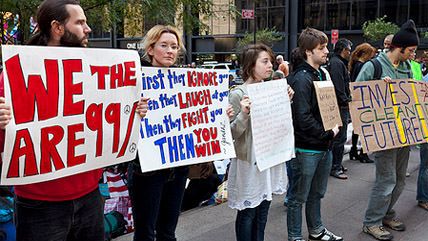The Great Inequality Debate
Is equality of income more important than equality of justice and authority?

Writing in Commentary not long ago, Seth Mandel drew out a nice point about the resurgence of the Democratic left: "Complaints over the last few years about the GOP being pulled to the right by conservatives," he wrote, "were not about liberals' desire to meet in the middle and compromise, no matter how much they might decry the supposed extremist drift of the right. What they wanted was their very own Tea Party."
The Occupy movement briefly seemed to provide one, but it lacked the Tea Party's staying power. Still, the passions that animated the Occupiers have breathed new life into the left, from the East Coast — where Bill de Blasio won election as New York's new mayor on a promise to end economic inequalities — to the West, where Kshama Sawant, a member of the Socialist Alternative Party, won a seat on the Seattle City Council by campaigning for a $15 minimum wage.
Victories like those have inspired imitation: Several candidates in the Northeast have expropriated de Blasio's "tale of two cities" theme for their own campaigns, and President Obama ended 2012 with a speech calling economic inequality "the defining issue of our time."
All of this has the liberal commentariat rapturous. The abstract notion of equality is the lodestar of the American left, just as the abstract notion of liberty is the lodestar of the right. Or at least some liberty: Most conservatives care greatly about the economic kind, and the sight of an entrepreneur caught up in red tape enrages them. But certain conservatives care less about other kinds of liberty, such as the freedom of gays and lesbians to pursue their own happiness as they define it, or the freedom of a young black male in a hoodie to walk down the street with a bag of Skittles unaccosted.
Likewise, the left is selective in its ardor for equality. It is stirred by the cause of social equality for minority groups, and by economic equality for all. Other kinds of equality matter less — e.g., to evangelicals, the belief that we are all equal in the eyes of God is an immensely important social leveler. To at least the secular left, this solidarity of faith seems not only insignificant but potentially malignant — an "opiate of the masses," as Marx called religion generally.
Even on the question of economic inequality, many on the left tend to focus only on one dimension: the gap between the rich and poor. Conventional liberal opinion holds that the gap is bad not only because of its consequences, but inherently — and the bigger the gap, the worse things are.
But that doesn't follow. As self-described "liberaltarian" Will Wilkinson noted in a 2009 paper, U.S. inequality as measured by the Gini Coefficient (the most common measure of such inequality) is about the same as in Ghana. But being poor in the U.S. is much better than being poor – or for that matter rich – in Ghana. This raises another point Wilkinson makes, about consumption: When you look at how people actually live, what they have in the bank matters much less than their daily experience.
The difference between having a car of any kind or none at all is vastly greater than the difference between having a used Chevy and a new Porsche. And while the rich in the U.S. have gotten richer, so have the poor: Since 1979 the income of the poorest 20 percent of Americans has almost doubled, and market economics has provided them with riches, such as cellphones, once available only to the most well-off. This helps explain why the difference in happiness among income groups in the U.S. is vastly smaller than the difference in wealth. Which of those measures should matter more?
Focusing only on inequalities of result also ignores another important dimension to the question. Again, Wilkinson: "It's not enough to identify a mechanism of rising inequality. An additional argument is required to show that there is some kind of injustice or wrongdoing involved."
It is possible that inequality is rising because the system has grown more rigged. But as Mickey Kaus pointed out recently, while you would expect inequality in a rigged system, you also should expect it in a fair one: "Once the meritocratic centrifuge has sorted everyone out, there won't be that many talented people at the bottom to rise in heartening success stories." Divining how much truth there is in these competing narratives is vastly more complex than ideologues of any stripe would like to think.
Correcting inequalities caused by system-rigging is desirable, but "correcting" (as opposed to merely alleviating) inequalities caused by merit-sorting would actually be unjust. It also would require creating an inequality of a different sort: the inequality of authority.
Perpetual market interventions in the name of economic equality require a perpetual class of interveners who have the power to overrule the free choices made by everyone else.
Naturally, those coercive interventions require handing the levers of coercion over to progressives — which explains why this sort of inequality never seems to bother them in the slightest.


Show Comments (265)